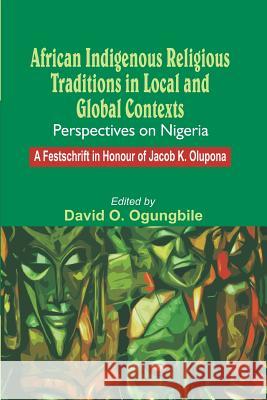African Indigenous Religious Traditions in Local and Global Contexts: Perspectives on Nigeria » książka
African Indigenous Religious Traditions in Local and Global Contexts: Perspectives on Nigeria
ISBN-13: 9789785325010 / Angielski / Miękka / 2015 / 460 str.
This volume honours one of the great scholars of our era, Professor Jacob Olupona. Although he has conducted significant portions of his career outside of Nigeria, he has not separated himself from his colleagues or from interests in religions in Nigeria and elsewhere in Africa. His publications and presentations offer the international scholarly community important critical insights into a range of religious activities, life ways and ideas originating in Africans and the African Diaspora. In spite of the diversity in the thoughts and opinions expressed, and equally of the range of disciplines and topics contained in the book, one can say that the contributors have developed a shared concern about the role of African Indigenous Religious Traditions in the processes of development and the context within which it (development) had or is taking place. The book guides us to a deep understanding and appreciation of how Africans in their varied situations grapple with existential problems through philosophical ruminations, complex ritual processes, cultivated memory and organized coping strategies.
This volume honours one of the great scholars of our era, Professor Jacob Olupona. Although he has conducted significant portions of his career outside of Nigeria, he has not separated himself from his colleagues or from interests in religions in Nigeria and elsewhere in Africa. His publications and presentations offer the international scholarly community important critical insights into a range of religious activities, life ways and ideas originating in Africans and the African Diaspora. In spite of the diversity in the thoughts and opinions expressed, and equally of the range of disciplines and topics contained in the book, one can say that the contributors have developed a shared concern about the role of African Indigenous Religious Traditions in the processes of development and the context within which it (development) had or is taking place. The book guides us to a deep understanding and appreciation of how Africans in their varied situations grapple with existential problems through philosophical ruminations, complex ritual processes, cultivated memory and organized coping strategies.











